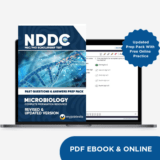- Your bag is empty
- Continue shopping
Bookstore
NDDC Scholarship Past Questions And Answers – Sociology
Original price was: ₦5,000.₦3,900Current price is: ₦3,900.
Up-to-date / Real NDDC Scholarship Sociology Test Past Questions and Answer will help you prepare faster and smarter for the NDDC Scholarship. Got shortlisted with few days or hours left to prepare? this pack will give you the insight you need to ace the tests and improve your chance of passing the test.
Looking for a Different Course? Check all NDDC Past Questions Here –>
NDDC Scholarship Past Questions And Answers – Sociology
Download the NDDC Scholarship Sociology Test Past Questions Practice Pack from this page in PDF format. The NDDC Scholarship test past questions pack makes your preparation easier and much better. Featuring questions from previous assessments as well as solutions to these questions.
About NDDC Nigeria
The Niger Delta Development Commission is a federal government agency established by Nigerian president Olusegun Obasanjo in the year 2000 with the sole mandate of developing the oil-rich Niger Delta region of Nigeria.
About The NDDC Scholarship
- The Niger Delta Development Commission (NDDC) Scholarship is a program initiated by the Nigerian government to provide educational opportunities for students from the Niger Delta region. The Niger Delta region is known for its significant oil and gas reserves, but it has also faced numerous socio-economic challenges. One of the ways the government aims to address these challenges is by offering scholarships to qualified students from the region to pursue higher education overseas.
- The amount for the foreign scholarship shall be based on the prevailing exchange rate of the Naira.Current Application Closing Date is 3rd November, 2023.
Application Procedure
- 1.The following documents must be attached to the application:
2.Recent passport photograph
3.Local Government Identification Letter
4.Post Graduate admission letter from a recognized overseas university
Relevant degrees from recognized universities
5.NYSC Discharge/Exemption Certificate
6.Upon successful completion of the application form, a registration number will be automatically assigned.
7.Applicants are advised to print a hard copy of the online-generated acknowledgment for future reference.
8.All shortlisted applicants will be announced and posted on the NDDC website: www.NDDC.gov.ng. These shortlisted candidates will subsequently be required to take part in a Computer-Based Test (CBT). Eligibility
To be eligible for the scholarship, a scholar must hail from the Niger Delta Region and have achieved a First Class Degree, Second Class Upper, or Lower Division.
The Selection Process
- 1. Initial Application: Interested candidates must submit an online application via the Commission’s Website.
2. Preliminary Shortlisting: Candidates will be shortlisted based on the following criteria:
WASSCE/NECO results
3. Undergraduate Degree classification (1st Class, Second Class Upper/Lower)
4. Local Government Identification
5. Computer-Based Test: Shortlisted candidates will undergo a computer-based test conducted by our consultants in Rivers State.
6. Minimum Test Score: Candidates must achieve a minimum score of 70% in the test to proceed to the next stage.
7. Further Shortlisting: Candidates who successfully pass the test will be further shortlisted.
8. Final Verification: The final verification of the candidates will be done through the Local Government Area (LGA) and Community Development Committee (CDC). - About the NDDC Scholarship test format
- NDDC overseas scholarship test was conducted by Cinfores-Ltd, between 2010 and 2015. Since 2016, the tests are now conducted by MEIL (MARG Educational International Limited).
The test usually comprises of 2 sections –
1. General questions which everyone will have to sit, and
2. Discipline-based questions.
For example, candidates in Engineering and Science related disciplines could take a mix of science-based questions like maths, English, physics and chemistry for part 1, then discipline-specific questions for part 2. The test usually last between 30 to 60 minutes.
Sample Past Questions And Answers for NDDC Scholarship – Sociology
Question 1: Who is considered the founding figure of sociology?
A Auguste Comte
B Karl Marx
C Max Weber
D Emile Durkheim
Answer: A Auguste Comte
Question 2: What is the term for a social group characterized by common interests and activities, often with shared norms and values?
A Community
B Society
C Subculture
D Organization
Answer: B Society
Question 3: Which sociological perspective focuses on the macro-level analysis of society and emphasizes social structures and institutions?
A Symbolic Interactionism
B Conflict Theory
C Functionalism
D Postmodernism
Answer: C Functionalism
Question 4: Who developed the concept of the “sociological imagination”?
A Max Weber
B Emile Durkheim
C C. Wright Mills
D George Herbert Mead
Answer: C C. Wright Mills
Question 5: What is the term for the process by which individuals learn and internalize the values, beliefs, and norms of their culture?
A Socialization
B Assimilation
C Cultural relativism
D Acculturation
Answer: A Socialization
Question 6: Which sociological research method involves the systematic observation of people in their natural environments?
A Surveys
B Experiments
C Participant observation
D Content analysis
Answer: C Participant observation
Question 7: Who coined the term “anomie” to describe a state of normlessness or social disintegration?
A Max Weber
B Karl Marx
C Emile Durkheim
D Herbert Spencer
Answer: C Emile Durkheim
Question 8: What is the term for a society in which social stratification is primarily based on economic factors, such as wealth and income?
A Meritocracy
B Feudalism
C Capitalism
D Oligarchy
Answer: C Capitalism
Question 9: Which theory posits that individuals are motivated by self-interest and that competition and market forces drive societal progress?
A Structural Functionalism
B Conflict Theory
C Rational Choice Theory
D Symbolic Interactionism
Answer: C Rational Choice Theory
Question 10: Who is known for his work on the “iron cage” of bureaucracy and the concept of the “Protestant work ethic”?
A Max Weber
B Karl Marx
C Herbert Spencer
D Emile Durkheim
Answer: A Max Weber
Question 11: What is the term for the unintended consequences of social institutions and practices?
A Dysfunction
B Anomie
C Manifest function
D Latent function
Answer: D Latent function
Question 12: Which social scientist is associated with the theory of “symbolic interactionism”?
A Karl Marx
B Max Weber
C George Herbert Mead
D Emile Durkheim
Answer: C George Herbert Mead
Question 13: Who introduced the concept of “class struggle” as a key driver of historical change in society?
A Max Weber
B Karl Marx
C Emile Durkheim
D Herbert Spencer
Answer: B Karl Marx
Question 14: What is the term for the process by which individuals from different cultural backgrounds come into contact and adopt elements of each other’s cultures?
A) Cultural assimilation
B) Cultural relativism
C) Cultural diffusion
D) Cultural hegemony
Answer: C Cultural diffusion
Question 15: Which sociological perspective emphasizes the role of symbols, gestures, and communication in shaping social interactions?
A Functionalism
B Conflict Theory
C Symbolic Interactionism
D Postmodernism
Answer: C Symbolic Interactionism
Question 16: Who is known for his theory of “social facts” and the study of suicide as a social phenomenon?
A Max Weber
B Karl Marx
C Herbert Spencer
D Emile Durkheim
Answer: D Emile Durkheim
Question 17: What is the term for the process of disintegration of traditional norms and values in a society?
A Modernization
B Anomie
C Ethnocentrism
D Globalization
Answer: B Anomie
Question 18: Who developed the concept of the “looking-glass self,” which refers to how individuals develop self-identity through social interactions and perceptions of others?
A Karl Marx
B Max Weber
C George Herbert Mead
D Emile Durkheim
Answer: C George Herbert Mead
Question 19: What is the term for the unjust or prejudicial treatment of individuals or groups based on their social identities?
A Stereotyping
B Discrimination
C) Prejudice
D Socialization
Answer: B Discrimination
Question 20: Which sociological theory focuses on the ways in which individuals and groups actively create and negotiate their social reality?
A Structural Functionalism
B Conflict Theory
C Social Constructionism
D Rational Choice Theory
Answer: C Social Constructionism
| Select Option | Get eBook, Get eBook+Online Practice, Get Online Practice |
|---|











Customer reviews
Reviews
There are no reviews yet.
Write a customer review